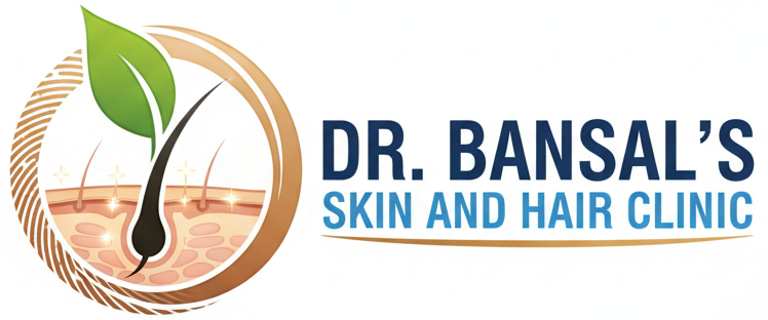Male/Female Pattern Baldness (Androgenetic Alopecia ) Treatment In Indore
Dr. Bansal's Hair Clinic, Indore
About Androgenetic Alopecia (AGA)
Androgenetic alopecia, or AGA, is the most common form of hair loss in both men and women.
Men: Receding hairline and thinning at the crown ("M-shaped" or "U-shaped" baldness).
Women: diffused thinning over the top of the scalp, frontal hairline usually preserved
Cause:
Genetic predisposition + androgen sensitivity of hair follicles (DHT)
DHT-miniaturizes the hair follicles (dihydrotestosterone), leading to thinner, shorter hair, with inevitable baldness.
Onset:
Men: late teens to 20s
Women: 30s–40s; commonly after menopause
⚕️ Diagnosis
Clinical examination: pattern of thinning
Family history
Scalp biopsy or trichoscopy-if in doubt
Blood testing for thyroid, iron, and hormones in women with diffuse loss
Treatment Options
1. Medical Treatments
Men
Medicine Mechanism Notes
Finasteride 1 mg/day Inhibits 5-alpha reductase → reduces DHT Prescription only, may take 3-6 months for effect.
Minoxidil 5% topical Stimulates hair follicles, prolongs the growth phase. Apply twice daily; may cause initial shedding.
Dutasteride (less common) Stronger 5-alpha reductase inhibitor Usually for resistant cases
Women
Medicine Mechanism Notes
Minoxidil 2–5% topical Stimulates growth 2% commonly used in women; 5% may cause scalp irritation
Spironolactone Anti-androgen, Useful for hyperandrogenism; prescription required
Oral contraceptives Decrease androgen levels Useful for individuals with hormonal imbalance
Flutamide / Finasteride Anti-androgen therapy is reserved for selected cases under a doctor's supervision.
Note: These medications take 3–6 months to show their visible effects. Consistency is the key.
2. Procedural Treatments
Procedure\tPurpose\tNotes
PRP Platelet-Rich Plasma stimulates dormant follicles. 3–6 monthly sessions are recommended.
Low-Level Laser Therapy (LLLT) increases circulation & growth, Home devices or clinic sessions
Hair Transplantation Restores hair in unhaired areas, FUE/FUT; permanent solution
3. Supportive Measures
Gentle hair care (no sulfate shampoo, soft brush, and minimal heat styling )
Healthy diet maintenance: consumption of protein, iron, zinc, vitamin D, and omega-3
Stress management: yoga, meditation, and regular exercise
Avoid hairstyles that pull on hair (tight ponytails, braids)
What Not to Do
Don't expect overnight results because hair growth is slow.
❌ Avoid using harsh chemical treatments, bleaching, or perming.
❌ Don't stop medications abruptly-hair may start falling again
Avoid the use of untested supplements or "miracle cures."
Avoid tight hats or hairstyles that pull on follicles
Prevention & Lifestyle
Eat healthily and keep your body well-hydrated.
Reduce stress since chronic stress accelerates hair loss.
Protect scalp from UV damage. Avoid smoking and excess alcohol intake, as they can exacerbate miniaturization. Early treatment can significantly slow the progression.
Care
Dr. Shreyas Bansal has over 46 years of experience in promoting hair health and wellness. At Dr. Bansal’s Homeopathy Clinic, located at 2 Manish Bagh, Sapna Sangeeta Road, Indore, we provide personalised care to strengthen your hair, improve scalp health, and restore confidence naturally.
Health Hairs AT
Beauty
+91 9926120111
© 2025. All rights reserved.
